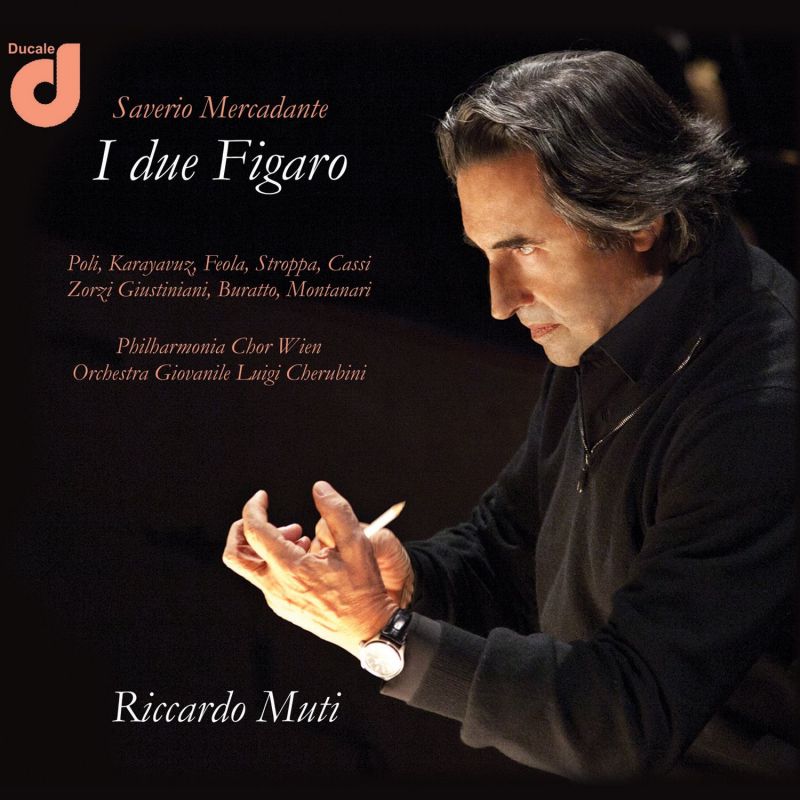MERCADANTE I due Figaro
Muti conducts Mercadante’s pre-reform Figaro opera
View record and artist detailsRecord and Artist Details
Composer or Director: (Giuseppe) Saverio (Raffaele) Mercadante
Genre:
Opera
Label: Ducale
Magazine Review Date: 10/2013
Media Format: CD or Download
Media Runtime: 166
Mastering:
DDD
Catalogue Number: DUC045-47

Tracks:
| Composition | Artist Credit |
|---|---|
| I due Figaro |
(Giuseppe) Saverio (Raffaele) Mercadante, Composer
(Giuseppe) Saverio (Raffaele) Mercadante, Composer Anicio Zorzi Giustiniani, Torribio, Tenor Annalisa Stroppa, Cherubino, Mezzo soprano Antonio Poli, Count Almaviva, Tenor Asude Karayavuz, Countess Almaviva, Soprano Eleonora Buratto, Susanna, Soprano Giovanile Luigi Cherubini Orchestra Mario Cassi, Figaro, Baritone Omar Montanari, Plagio, Baritone Riccardo Muti, Conductor Rosa Feola, Inez, Soprano Speranza Scappucci, Piano Vienna Philharmonia Choir |
Author: David Patrick Stearns
On first listen, though, one’s heart sinks a bit. Even with this smart, accomplished cast under Riccardo Muti, the opera seems like counterfeit Rossini – odd, since Mercadante’s place in history lies in his anti-Rossini reforms. That came later, represented on recordings by Virginia, which feels nondescript, no matter how much the Opera Rara forces bellow out the choral scenes (6/09), and Il giuramento (heard on an out-of-print Rodolphe LP from Radio France), which has more personality but is still the work of a composer who has purged much from his compositional manner but added little. Influences from Meyerbeer did not make Mercadante more interesting.
But once you’re accustomed to the Rossini-isms in I due Figaro, Mercadante emerges, however intermittently, as his own man during the many ensembles. Distinct from Rossini, whose ensembles are built on a dominating idea, Mercadante builds his almost orchestrally with layers of contrasting contrapuntal melodies. Arias have sophisticated orchestral tuttis. Spanish influences aren’t just on the surface but embedded in the opera’s best moment – the sublimely lyrical Act 3 Susanna/Figaro duet ‘Brutta cosa e l’esser moglie’.
Muti casts smaller voices than what’s typical in Mozart and Rossini but often with dark colouring – understandable with Eleonora Buratto’s Susanna (since she’s older than in Mozart) but less so with young Inez, though Rosa Feola is a wonderfully stylish singer. Mario Cassi’s Figaro needs more solid low notes. Antonio Poli’s Count has an extremely attractive tenor. Too bad Muti keeps everybody on a tight rein: this opera’s lesser moments could use more electricity.
Discover the world's largest classical music catalogue with Presto Music.

Gramophone Digital Club
- Digital Edition
- Digital Archive
- Reviews Database
- Full website access
From £8.75 / month
Subscribe
Gramophone Full Club
- Print Edition
- Digital Edition
- Digital Archive
- Reviews Database
- Full website access
From £11.00 / month
Subscribe
If you are a library, university or other organisation that would be interested in an institutional subscription to Gramophone please click here for further information.




